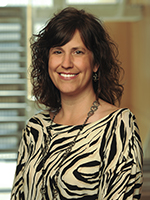
Increasingly sophisticated and available genetic testing generates big questions about functionality and ethics: When should testing happen? What results should healthcare providers disclose to patients? And who should get testing? A recent Northwestern Medicine exploratory study asked genetics experts to consider genome sequencing for newborn populations, revealing varying opinions about the future of genomics.
Currently, all infants in the United States undergo routine newborn screening to check for a specific list of rare but treatable conditions. Whole genome sequencing could expand the list exponentially, making health information about babies – and their families – available sooner and more thoroughly than ever.
The study, published in the Journal of Genetic Counseling, surveyed genetics professionals for their views on incorporating whole genome sequencing into routine newborn screening. Half believed that whole genome sequencing should be a supplement to newborn screening within the next 10 years, but opinions diverged on the details.
“There’s not a lot of consensus on this topic,” said senior author of the study Catherine Wicklund, associate professor in Obstetrics and Gynecology-Clinical Genetics and the Center for Genetic Medicine and director of the Graduate Program in Genetic Counseling. “A quarter of people thought whole genome sequencing shouldn’t be utilized at all on newborns.”
The sample of about 100 members of the American College of Medical Genetics and Genomics did agree on a few things. First, the majority believed that whole genome sequencing should not be used yet, nor should it be mandatory if available in the future. They also agreed that it should require parental consent and both pre- and post-test counseling: to help parents decide if they want their newborn to undergo sequencing and, afterward, to help them interpret the extensive results.
“Someone would need to sit down with parents to explain the test and all the different types of results you could get back: childhood-onset conditions that we can treat, ones that we can’t, adult-onset conditions that we can treat, ones that we can’t treat,” Wicklund said.
She sits on the Secretary Advisory Committee on Heritable Disorders in Newborns and Children, which recommends disorders for newborn screening. Right now, screening in Illinois includes 57 childhood medical conditions that have proven treatments, such as cystic fibrosis and sickle cell disease.

“Sequencing opens up a whole new door. You have to ask: Do I want to learn about a condition that won’t affect my child until he or she is an adult? Even if there’s nothing we can do about it?” Wicklund said.
Most experts thought parents should get to pick what information they will get and what they won’t. But those surveyed don’t agree on timing for this, particularly when adult-onset conditions should be revealed. For example, a mutation in a breast cancer gene may be detected in a newborn’s genome. While that information won’t have immediate clinical utility for the baby, it could point to an inherited mutation that the parents themselves didn’t know they carried.
“Most surveyed chose disclosure either at birth or after the age of 18. Some might be thinking about the impact on the rest of the family, while others think about protecting the autonomy of the babies and waiting until they can make their own decisions about getting the results back,” Wicklund said.
The investigators also asked experts what type of healthcare provider should give patients the different kinds of results. Though answers varied between physician geneticists, primary healthcare providers and genetic counselors, Wicklund points out that the question brings up another point to consider when discussing the future of genomics: infrastructure.
“As we talk about the newborn screening paradigm changing, we need to think about how can we continue to expand the workforce to meet some of these future demands that might exist,” she said.
The National Institutes of Health has already awarded $5 million to four pilot studies that will begin testing the use of genomic sequencing on newborns.
“A lot of people do think that someday everybody will have their genome sequenced. Like routine blood work and scans, it will be another piece of information physicians can use to help people optimize health, prevent disease and improve outcomes,” Wicklund said. “But before this happens, we need to work through the ethical issues as well as the infrastructure needed for actual implementation of that magnitude.”
This project was supported by the National Society of Genetic Counselors Public Health Special Interest Group. Elizabeth Ulm, a former student in the genetic counseling program, is the first author.






